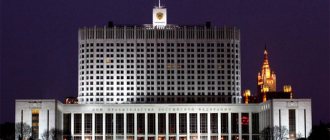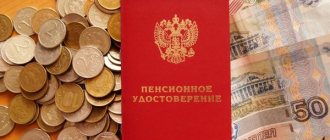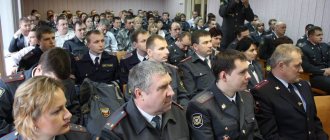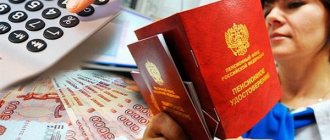- home
- Reference
- Pension indexation
Pension provision for persons who have sufficient length of service in the bodies of the Ministry of Internal Affairs is regulated by a separate law.
According to the procedure and conditions of appointment, as well as the rules for calculating the amount of payments, these persons are equal to military personnel and employees of other “law enforcement” departments. In 2021, all of them were affected by the state’s legislative decision to increase pension payments. We’ll talk about the size of the increase, the rules for calculating it and the position of government bodies regarding further growth below.
- 3.1 Have payments to working pensioners of the Ministry of Internal Affairs increased?
How pensions are calculated for former employees of the Ministry of Internal Affairs
The basic rule that you need to know to calculate the pensions of former police officers is that their size is set as a percentage of the salary for the corresponding rank and position.
Accordingly, the amount of security depends on the established amount of interest and actual salaries. The amount of salary for position and special rank is established by the Government in Resolution No. 878 dated November 3, 2011.
So, for example, an ordinary police officer in a populated area with a population of up to 100 thousand people. has a salary of 9,000 rubles. The salary of a police sergeant is 6,500 rubles. The size of the pension in this case would be calculated from 15,500 rubles. taking into account ongoing indexations.
Pension payments based on length of service
The amount of state support, if there is a sufficient indicator of length of service, is calculated taking into account:
- salary amount: for the last position (selected for the five previous years);
- for the title;
The calculation formula for 2021 is as follows:
- Rpo = 0.5 x (OD + OZ + NVL) x PC, where: Rpo - the desired value;
- OD - payments for the position;
- OZ - for the title;
- NVL - for length of service;
- PC - pension coefficient.
The amount in brackets in the formula has a different official name - cash allowance (DS). This is an individual indicator. It is determined for each recipient separately on the basis of an accounting certificate.
DD is taken into account when calculating additional preferences. The main ones are shown in the table:
| Base | Surcharge |
| Specialized experience over 20 years | 3% of DD for each year, but not more than 85% |
| Mixed experience over 25 | 1% of DD for each |
| Disability | 75% |
| Injury leading to disability | 85% |
For information: regional authorities also establish bonuses for the state maintenance of retired security officials.
All issues related to state support for dismissed security forces are dealt with by a special Department of the Ministry of Internal Affairs. However, documents are submitted at the place of duty . Registration of pensions for law enforcement officers has certain nuances. They are:
- The first step is to notify your boss that you want to retire. This is done in the form of a report. The document is submitted three months before the expected date. At the same time, it indicates, in addition to the desire to leave the position:
- causes;
- preferential grounds;
- date of dismissal.
- After signing the initial report, the actual registration process begins.
- It is necessary to fill out an application in the prescribed form.
- In general, the following documents are attached to it:
- a payslip containing a breakdown of periods of law enforcement activity (done by the personnel department);
- counterfoil of the monetary certificate (issued by the accounting department);
- consent to the processing of personal information;
- confirmation of the benefit, for example, an award certificate (if available);
- additionally submitted: work book (for mixed work experience);
- certificate of presence of dependents;
- certificate of disability;
- other.
- The documentation is carefully studied and sent to the Department. This government agency assigns the required government support.
Applicants for government assistance should prepare for a long wait. That is why there has been a tradition of announcing dismissal three months in advance . Department specialists have to check each period specified in the documents. Some are preferential, others are regular. A separate calculation is made for each, then the data is brought together.
Hint: the resigning security officer is compensated for elements of software that were not received for one reason or another. For example, for uniforms that a person did not have time to receive and use.
Indexation of the Ministry of Internal Affairs pension in 2021
The legislation on the salary of employees of the Ministry of Internal Affairs provides for a mandatory annual increase in their benefits by the inflation factor. Until 2021, there was a moratorium on increases for several years, so they were not carried out, and the purchasing power of employees, accordingly, fell.
In 2021, the coveted increase took place on October 1, and for pensioners it occurred in two directions at once. Firstly, the provision increased due to an increase in the salaries of existing employees, and secondly, due to an increase in the so-called reduction factor (the percentage of salary taken to calculate the pension).
Reference! Although the reduction factor has increased, it has not reached the level previously provided for in the law. Thus, the legislator envisaged its gradual increase from 54% in 2012 by at least 2% annually. But since 2015, such indexation has been regularly suspended by special laws. This moratorium has been extended into 2021. Therefore, the size of the increase turned out to be lower than established by law, which caused a negative reaction from some of the police pensioners.
How much did the pension increase?
So, let’s consider the percentage increase in both indicators that affect the size of the increase in the amount of support for former police officers from the state:
- The salary of current employees of the Ministry of Internal Affairs, in accordance with the consumer price growth rate (inflation), will increase by 4.3% from October 1, 2021. Consequently, the same increase was expected for pensioners of this department. To calculate the already increased content, it is necessary to multiply the previously obtained amount by 1.043. So, if the security before October 1 was received in the amount of 14,000 rubles, then after this date its amount will be 14,000 * 1.043 = 14,602 rubles.
- Reduction factor . Since pension benefits for former employees of the Ministry of Internal Affairs, including some allowances, are calculated in proportion to salary, its size directly depends on the latter. At the same time, to calculate the payments due, not 100% of the allowance is taken, but only some part of it. This is called the “reduction factor”. As of 2021, it was equal to 72.23% of the allowance. But from October 1, this coefficient was increased, and now the pension amount is calculated from 73.68% of allowance. The indicated difference of 1.45% made it possible to provide about 2%, so actively promised by the authorities (and the president, in particular), to the previously received content.
Let us try to clearly demonstrate the level of growth of Ministry of Internal Affairs pensions of 6.3% announced by the government.
For example, previously a former police officer received 10,000 rubles, which was 72.23% of the salary of an active police officer (meaning equal to 13,845 rubles). An increase in content by 4.3% ensured a salary of 14,440 rubles. Those. now the pensioner will receive 14,440 * 4.3% = 10,639 rubles. Thus, it can be seen that the increase was 10,000 / 10,639 = 1.0639 or 6.3%.
The required level of growth was made possible thanks to the funds reserved for these purposes in the 2021 budget. However, it was not planned to increase the reduction coefficient until the beginning of 2021.
Attention! According to experts, the average pension amount for former police officers after the October indexation was about 17,000 rubles.
Conditions for receiving a pension from the Ministry of Internal Affairs
Employees of the Ministry of Internal Affairs, like the military, are also civil servants. However, given the complexity of the work they perform, which often involves risks to health and even life, the government has developed a number of incentive measures that can compensate for the difficult conditions of service. In particular, all law enforcement officers have the right to receive a long-service pension. To do this, the following conditions must be met:
- From this year, the retirement age has been raised by a year and should be 46 years old ,
- work experience in authorities - 20 years .
If, upon reaching this age, a person has not accumulated the required work experience in the Ministry of Internal Affairs, then he can still apply for benefits if his total work experience is 25 years , and he has worked in the police for at least 12.5 years .
It is planned to increase seniority as gradually as age. This takes into account:
- years of military service,
- studying at a university,
- time spent working in government agencies.
Employees of the traffic police and transport police, all police departments (federal and regional throughout Russia), special forces military personnel, the National Guard, operational investigative and search units, investigative bodies, departments of the Federal Migration Service and the Federal Service for Turnover can count on a long-service pension from the Ministry of Internal Affairs for drug control and other units related to the Ministry of Internal Affairs. Participants in combat operations and anti-terrorist operations, including for service in the North Caucasus, and for their courage in detaining especially dangerous criminals, receive special pension supplements. The size of the pension depends on the length of service, as well as on the rank and reduction factor. The government planned to gradually increase it to 100%, but its size has been frozen for several years, although this year it was decided to increase it again and gradually bring it to the previously mentioned amount.
Don't miss: Which new inexpensive car to buy this year
In addition, employees of the Ministry of Internal Affairs can apply for a second pension - an insurance pension, which is paid by the Pension Fund to all working citizens of our country. This can be done after reaching retirement age, subject to the following conditions:
- minimum work experience - 9 years ,
- accrual of the required amount of insurance points on an individual personal account in the Pension Fund - this year they should be 13.8 points .
Has the 2nd pension been indexed?
General and special pension legislation for employees of law enforcement agencies and law enforcement agencies allows for the payment of two pensions to former police officers, and in some cases to family members of a deceased employee of the Ministry of Internal Affairs.
This is due to the fact that the law does not prohibit such a person, after dismissal from service in the Ministry of Internal Affairs due to length of service, to receive departmental support while continuing to work in “civilian” positions. In the process of such activity, this person can earn the right to a general old-age pension (for this it is only necessary to have a minimum amount of insurance coverage and the level of the individual pension coefficient).
In this case, both types of security are paid and increased independently of each other . This means that the old-age pension is indexed on the same basis as for all other citizens. With such a second pension, it was also increased by even more than the inflation factor. The growth rate of the second payment through the Pension Fund of the Russian Federation was 7.05%.
Important! The growth rules for both pensions also apply to family members of a deceased or deceased employee (including a former employee). Indexation of the size of the insurance pension should not in any way affect the possibility of indexation of departmental payments.
Have payments to working pensioners of the Ministry of Internal Affairs increased?
After dismissal from the internal affairs bodies, a former police officer has the right to continue to carry out labor or entrepreneurial activities. At the same time, he does not lose the right to a pension from the Ministry of Internal Affairs.
But its payment is suspended if they have entered into a contract for military or other equivalent service. Upon termination of such service, payments will resume. If any indexation occurred during this time, he will receive payments in an increased amount.
As for the general civil old-age pension, 2021 was also no exception in the series of the last few years when working pensioners were not included in the list of persons to whom payments were indexed.
The indexation that occurred from January 1, 2021 will affect working pensioners only when they stop their activities and retire . This is also relevant for the second pension of a former employee of the Ministry of Internal Affairs who is working in a given year under an employment contract or as an individual entrepreneur.
How are pensions of the Ministry of Internal Affairs formed?
In most cases, employees of the Ministry of Internal Affairs are paid pensions based on length of service. But there are some differences in the accrual and formation process compared to regular pension payments.
When an employee of the Ministry of Internal Affairs retires, he is provided with certain benefits, since their activities are associated with an irregular work schedule, risk to human life and other factors. The retirement process depends directly on the type of pension payments. At the moment the main types are:
- For the loss of a breadwinner. 2. Based on length of service. 3. By disability group.
In order to apply for a pension, a citizen must have a service record of at least 25 years and direct labor activity of at least 12.5 years. To register, you need to come to a branch of the Pension Fund of the Russian Federation with the following documents:
- monetary certificate; ⦁ calculation based on the length of service of the period worked; ⦁ statement; ⦁ consent to the processing of personal information; ⦁ a document confirming the application of preferential conditions.
If a citizen applies for a disability pension, he must also present a certificate from a medical expert commission, which determines one of three groups.
If the pension is issued by a relative of the deceased, it is required to present to the Pension Fund employees a document confirming the death of the Ministry of Internal Affairs employee; decision of the judicial authorities to declare a missing close relative missing; a document confirming relationship with a former employee of the Ministry of Internal Affairs; an extract from the order to exclude the deceased from the Ministry of Internal Affairs; an investigation document related to identifying the cause of death and the conclusion of a military medical commission.
In the process of processing pension payments, a ministry employee is required to submit a report to the head of the Ministry of Internal Affairs. For this purpose, there is a specially prepared form on which the fact of receiving an imminent pension payment is indicated. Personal data (full name, assigned title, telephone number, as well as legal and actual address of residence) must also be specified there.
The main part of the form indicates the basis for dismissal, data on cash payments, type of pension and, if any, it is necessary to indicate information about the previously assigned pension, as well as general information about children and family. After writing the application, the date and signature of the applicant are placed.
Benefits will be assigned based on the calculated pension data. They depend on the age of the employee of the Ministry of Internal Affairs, marital status and status. For example, if an employee of the Ministry of Internal Affairs has received pension payments based on length of service, then he has the right to receive the following allowances:
- 1st disability group upon reaching 80 years of age, a 100% bonus is awarded; ⦁ for participants in combat operations, the pension increases by 32%, if they have reached 80 years old - then 64%; ⦁ for one disabled person - 32%, for 2 - 64%, if more than 3 - 100%.
It is important to know! If a disabled person independently receives pension payments, then all allowances are cancelled.
Former employees of the Ministry of Internal Affairs have the right to apply for old-age pension payments, in addition to a long-service pension. To do this, it is necessary to take into account the insurance period of at least 5 years, the age of 60 years and the presence of a previously assigned pension. In order to apply for a second pension, it is necessary to provide the Pension Fund employees with the following documents:
- Passport. 2. Certificate of pension payments. 3. SNILS. 4. Certificate of income. 5. Work record book.
Don't miss: How will pensions be assigned in Russia?
A survivor's pension is accrued when a family is left without the support of a breadwinner who served in the structures of the Ministry of Internal Affairs. This type of pension can only be applied for by disabled citizens, namely: retired parents, disabled people, relatives who are raising grandchildren, children or brothers of the deceased, as well as children under the age of majority.
It is important to know! The pension can be received within three months after the official dismissal of the deceased. Those who were seriously injured during service or if a citizen’s health deteriorated 3 months after the end of service in the Ministry of Internal Affairs have the right to apply for a disability pension. Disability may occur for the following reasons:
- contusions; ⦁ illness during the performance of official duties; ⦁ injuries during service; ⦁ injuries.
The amount of the pension will depend on the group, which is appointed by a medical commission of experts. Additional allowances can be received by pensioners who have reached 80 years of age and citizens who have disabled family members and participants of the Second World War.
What the authorities say
The state attaches great importance to the material support of both employees of the Ministry of Internal Affairs and pensioners of this department. Including for this reason, almost immediately after the increase in 2021, the upcoming new indexation was announced. This time, the relevant defense committee of the State Duma of Russia made an official statement that it would propose an amendment to the 2021 budget that would include funds for the indexation of pensions of security forces from the beginning of the year, i.e. from January 1.
It is stated that the expected increase will be 4.3% in respect of the salary of current employees of the ministry. Taking into account the fact that the moratorium on increasing the reduction coefficient has not yet been extended, the increase in payments in general will be at least 6.3% . The President has not yet spoken out on this issue, but, commenting on the 2021 indexation, he promised to further improve the system of social guarantees for law enforcement officers.
In conclusion, let us summarize some results. In 2021, there was the most significant increase in pensions for former employees of the Ministry of Internal Affairs in recent years. Taking into account the increase in the salary of active police officers and the increase in the size of the reduction factor, the level of increase in payments was 6.3%. This increase occurred on October 1, 2021 and, according to the authorities, will soon happen again.
Reform, salaries and pensions of the Ministry of Internal Affairs of the Russian Federation from 01/01/2021 - the latest important data
Discussion of a new reform to reduce employees and expenses, increase length of service from 20 to 25 years, decertify staff, salaries, pensions and length of service in the Russian Ministry of Internal Affairs (police) 2020-2021 attracted the attention of the head of state. In this regard, the President of the Russian Federation V.V. Putin at the next meeting of the international Valdai Club stated that optimization of expenses for the Russian Ministry of Internal Affairs, the Russian Ministry of Defense and other law enforcement agencies is only being discussed and no decisions have been made yet. “These are all discussions within government departments among themselves,” said the President of the Russian Federation. Read more details BELOW.
According to the president, the authorities have not yet planned to either reduce or increase “any deadlines for anything.” He explained that discussions are ongoing within the government and we are talking about only one of the ideas of the Ministry of Finance, which, moreover, has not yet reached it. The head of state promised that, when making appropriate decisions, he would take into account the economic situation in the country, as well as the incomes of Russians, including security forces and the military. President of the Russian Federation Vladimir Putin assured that optimization of spending on law enforcement agencies is only being discussed and no decisions have been made yet.
In turn, the Russian Ministry of Internal Affairs is categorically against the proposals of the Ministry of Finance to reduce the staffing level of the ministry, transfer some functions to civilian departments and merge the Ministry of Internal Affairs, the Federal Penitentiary Service, the FSSP and the State Courier Service (SFS). TASS reports this, citing a source. “The Ministry of Internal Affairs categorically rejects the proposals of the Ministry of Finance of the Russian Federation,” the law enforcement agency said in a statement. Let us recall that on October 15, 2021, signed by the First Deputy Secretary of the Security Council of the Russian Federation, Yuri Averyanov, a letter was sent to the First Deputy Minister of Internal Affairs of the Russian Federation, Alexander Gorovoy, about considering the project of the Ministry of Finance of the Russian Federation to optimize the costs of law enforcement agencies. If you believe that this is not a fake, then the response of the Russian Ministry of Internal Affairs to the Russian Security Council to the proposal of the Russian Ministry of Finance should have been before October 20, 2020. However, according to the portal “Fontanka. Ru”, this is not the first idea of the Ministry of Finance to reform the state apparatus. Previously, other ideas were put forward - for example, to bring the foreign intelligence service, the federal security service and the federal security service under unity of command. So far, the proposals of Russian Finance Minister Anton Siluanov to reduce spending on security forces have not found support in the Kremlin.
According to the Izvestia newspaper, the Ministry of Finance proposed the following: to reduce the staffing of internal affairs bodies by 10% due to vacancies and the transfer of employees whose work is not related to the performance of law enforcement functions to the civil service; transfer coordination of the program for the resettlement of compatriots to the Ministry of Labor, and control and licensing functions in the field of legal drug trafficking to the Ministry of Health; optimize the management apparatus by bringing the ratio of the number of bosses to the number of subordinates according to the “herringbone” principle; create a unified settlement center, as well as a unified system of material and technical (rear) support for the “power block” to centralize financial and economic activities; create a single law enforcement agency based on the Ministry of Internal Affairs, which includes the functions and tasks of the Federal Penitentiary Service (FSIN), the State Courier Service (SFS) and the Federal Bailiff Service (FSSP) while simultaneously reducing the number; increase the shelf life of clothing; establish the maximum amount of monetary allowance taken into account for calculating “military” pensions at no higher than 80% (currently 73.68%); exclude from the legislative norm the mandatory indexation of “military” pensions by at least 2% above the inflation rate; increase the maximum length of service for retirement from 20 to 25 years, not including the period of study.
An Izvestia source close to the presidential administration confirmed the existence of such proposals from the Ministry of Finance. They were also confirmed by the interlocutor at the Ministry of Defense, which also received the letter. Experts interviewed by Izvestia linked the proposals of the Ministry of Finance with the desire to save budget money.
Optimizing the structure of law enforcement agencies will help save about 20 billion rubles from the treasury annually - this is 3% of the amount allocated for their maintenance, estimated Igor Nikolaev, director of the FBK Grant Thornton Institute for Strategic Analysis. However, he noted that, apparently, there was no goal to gain a significant amount of money: in this case, they would have proposed laying off more than 10% of employees. — From the point of view of personnel policy, such reductions are insignificant: after all, they will occur primarily due to vacancies. And managers often keep 10–15% of places free just in case of a crisis, so that they don’t have to “cut to the quick,” the expert noted.
The 2021 budget bill provides for the allocation of 2.4 trillion rubles for national security and law enforcement. In the plan for 2022, these expenses may be reduced by 46 billion rubles, in 2023 - by 12 billion rubles.
The largest budget belongs to the internal affairs bodies; they are proposed to allocate more than 711 billion rubles in 2021, 745 billion rubles in 2022 and 762 billion rubles in 2023. The remaining funds are allocated for the prosecutor's office, the National Guard, justice authorities and other law enforcement agencies.
The proposals of the Ministry of Finance are aimed primarily at saving on law enforcement activities, and this goal will definitely be achieved, Deputy Director of the Institute of Forecasting of the Russian Academy of Sciences Alexander Shirov is sure. However, they do not correspond to the trends of recent years, when Russia was moving towards the division of functions of the security forces. For example, the same FSIN was part of the structure of the Ministry of Internal Affairs 20 years ago, the expert recalled. Therefore, the questions of how the new body will be managed and whether the quality of work will be maintained remain open.
If the proposals of the Ministry of Finance to reduce the number of employees and create a unified law enforcement structure are accepted, this will be the right decision, since the law enforcement agencies really need optimization, said the Commissioner for the Protection of the Rights of Entrepreneurs in Detention, Alexander Khurudzhi. Today, it often happens that there are three supervisors per worker, and many duties are performed formally: for example, in response to their appeals to law enforcement agencies, citizens and entrepreneurs often receive so-called “unsubscribes.”
However, Alexander Khurudzhi noted that optimization should not affect the implementation by law enforcement agencies of their main function - maintaining public order. He added that under no circumstances should the system of local police officers be cut, since they are on the front line and the safety of citizens directly depends on their work.
If we talk about employee salaries, then, as the TASS agency reports, more than 28 billion rubles will be additionally allocated for salaries to employees of the Ministry of Internal Affairs and the National Guard, according to the explanatory note to the draft budget for 2021-2023. “[It is planned] to increase budget allocations for the salary of employees and military personnel of the Ministry of Internal Affairs of Russia and the National Guard in 2021 by 14,136.6 million rubles and in 2022 by 14,702.0 million rubles,” the document says.
Over the next two years, an additional 10.6 million rubles will be allocated for training and advanced training of employees of the Russian Ministry of Internal Affairs related to the suppression of crimes in the field of information technology. Expenses for the activities of educational institutions of the ministry will be reduced in 2021 by 335.8 million rubles, in 2022 - by 134.1 million rubles and increased by 1.8 million rubles in 2023. In 2021, the budget for salaries of personnel of migration units of the Ministry of Internal Affairs of Russia will be increased by 628.2 million rubles, in 2022 - by 653.3 million rubles.
For the main event “Management of the internal affairs bodies of the Russian Federation and organization of the activities of the Russian Ministry of Internal Affairs system”, the budget for remuneration of workers and the salary of employees in 2021 will decrease by 487.1 million rubles, in 2022 - by 625.7 million rubles and will increase in 2023 year by 2.4 billion rubles.
Budgets of the Investigative Committee and the Prosecutor's Office
The expenses of the Investigative Committee of the Russian Federation and the Prosecutor General's Office of Russia are planned to be reduced in 2021 by more than 1 billion rubles, according to the explanatory note to the draft budget for 2021-2023.
According to the document, budget allocations for the Investigative Committee of the Russian Federation in 2021 will amount to more than 48.7 billion rubles, in 2022 - over 48.9 billion rubles, in 2023 - more than 50.5 billion rubles. “The volumes of budgetary allocations provided for in the bill compared to the volumes approved by 380-FZ [“On the federal budget for 2021 and for the planning period of 2021 and 2022”], in 2021 were reduced by 1.2 billion rubles, in 2022 they were reduced by 2.1 billion rubles in 2023 compared to the volumes provided for by the bill for 2022, increased by 1.6 billion rubles,” the document says.
The change in expenses was also affected by a decrease in budget allocations provided for wages in connection with missing indexation in 2021 by 334.5 million rubles, in 2022 by 1.3 billion rubles and an increase in 2023 by 1.3 billion rubles In addition, funding for the purchase of goods, works, services, as well as work in the field of information and communication technologies will be reduced.
The budget of the prosecutor's office in 2021 will be more than 85.8 billion rubles, in 2022 - over 85.9 billion rubles, in 2023 - more than 88.6 billion rubles. “The volumes of budgetary allocations provided for in the bill <...> in 2021 were reduced by 1 billion rubles, in 2022 they were reduced by 3 billion rubles, in 2023, compared to the volumes provided for by the bill for 2022, they were increased by 2.6 billion rubles ", the document says.
The change in expenses in 2023 was influenced by an increase in budgetary allocations to ensure the participation of prosecutors in sessions of cassation and appeal courts of general jurisdiction, and to remuneration of employees of budgetary institutions. A reduction in budget allocations is provided for a number of purchases.
According to REGNUM news agency, the proposal of the Russian Ministry of Finance to carry out a reform of the Ministry of Internal Affairs with a reduction in the number of employees and the creation of a single body for the Federal Penitentiary Service, the State Fiscal Service and the Federal Bailiff Service on the basis of the Ministry of Internal Affairs, caused heated discussion among Internet users. Citizens shared their opinions in the Yandex.News service.
“Many honored operatives who take part in hot spots and stand in the way of armed bandits are offended by the question of the presence in the authorities of many people in uniform with big stars, who did not leave their offices throughout the so-called service, fight with papers and receive orders, medals, regular ranks and positions. Question: why not transfer this category to civilian personnel, as was done in the Ministry of Emergency Situations?” — asks a user under the pseudonym “Caesar.”
Some commentators have criticized the Ministry of Finance for the fact that the abstract “cutting” of employees could lead to even fewer police officers patrolling city streets. They call for a reduction in the leadership team, and, on the contrary, for an increase in ordinary police officers who “come into contact with the population.” “Everything is returning to normal. It’s just scary to read about the next reduction. Apparently the authors of the project do not know that police patrols have practically disappeared on the streets of cities and towns, especially in small municipalities,” writes Sergei A.
Some users began to list what needs to be changed in the existing system of the Ministry of Internal Affairs. They are confident that the reduction can be replaced by the transfer of some departments to the civil service. “The reform must begin with the reduction of leadership positions in the main departments and their divisions. Convert to civilian use such services as: headquarters, personnel, rear services, press services, information centers. As a result, many leaders will flee from them. There is no need to reduce them. The Council of Veterans should be refocused on transferring experience to young people and helping veterans of the Ministry of Internal Affairs, and not just on maintaining museums,” says Natalya.
There were also those who called for the name of the police to be changed again. Instead of returning to the police, citizens are advised to take the experience of foreign countries and create a gendarmerie. In addition, again and again there is a call to reduce the leadership of the Ministry of Internal Affairs and in no case touch ordinary police officers. “It’s the police, it’s the police! Why are they being clever there! The FSIN was also already part of the Ministry of Internal Affairs. Create a “gendarmerie” and introduce all structures there as divisions. And all will be well! And the staff needs to be cut from the department, because you won’t find police officers on the streets during the day and you won’t even be able to shout enough! Where else to lay off employees, who are already not enough to ensure basic order on city streets? Not to mention the villages!” — wrote Valery I.
Former employees of the Ministry of Internal Affairs and other law enforcement agencies receive pensions according to the same rules as military pensioners. Every year their pensions increase, and 2021 will not be an exception. The information and analytical financial publication “Banks Today” explains how pensions for this category of pensioners are calculated, when and by how much they will be raised.
Long service pension in the Ministry of Internal Affairs system
Pension provision for employees of the Ministry of Internal Affairs, the National Guard, the Federal Penitentiary Service and the State Fire Service is regulated by the same standards as pensions for military personnel - this is the Law of the Russian Federation No. 4468-1 of February 12, 1993. That is, law enforcement officers have the right to a pension based on length of service, and in two options:
those who on the day of dismissal from service had 20 years of service or more; those who were dismissed from service due to health reasons, age limit or reduction, but have at least 12 years and 6 months of service, a total work experience of 25 years or more (calendar), and have already reached 45 years of age .
In accordance with the law, the size of pensions of employees of the Ministry of Internal Affairs and other law enforcement agencies is determined. So, this pension cannot be less than the social pension, and the calculation procedure is as follows:
upon dismissal due to length of service of 20 years or more: 50% of salary plus 3% for each year of service over 20 years (but not more than 85%); upon dismissal with a length of service of 12.5 years or more and a total length of service of 25 years or more: 50% of the salary for a total length of service of 25 years plus 1% for each year of total experience beyond this.
Moreover, the amount of monetary compensation in this case consists of the official salary, salary according to rank and allowances (including for length of service), the total amount of which is then multiplied by a reducing factor.
The reduction factor in 2021 is 73.68%. Initially, in 2012, it was set at 54%, and then it was supposed to rise annually by 2%, but in fact it is raised literally manually - by different values and not every year.
The length of service itself includes years of direct service and some other periods. For example, for employees of the Ministry of Internal Affairs, the length of service includes the period of study - no more than 5 years and according to the ratio “1 year of study = 6 months of service.” If the service was in the regions of the Far North and equivalent areas (and in other territories with unfavorable conditions of service), the length of service is calculated at a preferential rate - each calendar year of service gives an increase in length of service.
Pay and pensions also increase by the regional coefficient - and if a pensioner has served for at least 15 years in the Far North or at least 20 years in equivalent regions, the increased pension will remain when moving to another region.
Pensions for mixed service
As mentioned above, a former employee of the Ministry of Internal Affairs or other law enforcement agencies may have a length of service of only 12 years and 6 months, but if he has a total insurance period of 25 years or more, has reached the age of 45 and was dismissed from service for health reasons or due to reaching the age limit, he becomes entitled to a pension based on mixed service.
It is calculated based on the total length of service - for 25 years, 50% of the salary is accrued, and for each year on top of this another 1%. But what is also important is that such pensioners can also apply for an old-age insurance pension, however, if they meet all the requirements.
These are standard requirements for assigning an insurance pension:
age – no less than the generally established pension age (in 2021 it will be 61.5 years for men and 56.5 years for women); availability of insurance experience (at least 12 years in 2021); availability of pension coefficients (at least 21 in 2021).
And in this case there is one peculiarity - the insurance period will not include those years that are taken into account when assigning a long-service pension. That is, if a pensioner served in the Ministry of Internal Affairs for 15 years, and his total length of service is 25 years, then the years of service in the Ministry of Internal Affairs will not be included in the insurance period for assigning an insurance pension.
On the other hand, if a person has served less than the minimum 12.5 years, then he does not receive the right to a long-service pension, and then all years of service can be included in the insurance period.
And one more nuance - the “second” pension from the Russian Pension Fund is assigned without taking into account the fixed payment. That is, the amount will be determined only by pension points - for a minimum of 21 coefficients, a pensioner in 2021 will receive only 2,076.06 rubles. In fact, this is more of an additional payment than a full pension (and since the total payment will be more than the subsistence level, the pensioner will not receive the right to a social supplement).
Increasing pensions for former employees of the Ministry of Internal Affairs
As mentioned above, pensions for employees of the Ministry of Internal Affairs, the National Guard and other law enforcement agencies are calculated according to the same rules as military pensions - as a certain percentage of salary, reduced by a reduction factor. Accordingly, the pension can increase only in two ways:
increasing pay for current employees of the Ministry of Internal Affairs; increasing the reduction factor.
In 2021, both figures were increased simultaneously - salaries increased by 4.3%, and the reduction factor increased by 2 percentage points. On October 1, 2021, the salaries of military personnel and employees of other law enforcement agencies were indexed by 3%; an increase in the reduction coefficient is not planned. In fact, pensions of former employees of the Ministry of Internal Affairs have increased by only 3% since October 1 - this is even less than the inflation accumulated since the beginning of the year.
They started talking about the reform of the Ministry of Internal Affairs back in 2021. It was clear that the structure of the department was bloated, there was duplication, and the staff needed to improve their skills. Some steps to optimize the structure of the authorities (including issues of salaries, pensions and staff reductions) have been taken over the past three years. But conversations about reform continued, and today they have reached a new level, because administrative reform has begun, a reduction in the state apparatus, and all employees of the Ministry of Internal Affairs, although formally, are considered civil servants. Hence their well-founded concern for their future. How is it planned to continue reforming this law enforcement agency in 2020-2021?
As the Vedomosti newspaper recalls, among the first, the new Government of the Russian Federation adopted a number of resolutions that establish bonuses of up to 100% of the salary of police officers and National Guardsmen in Moscow, St. Petersburg, the Moscow and Leningrad regions. This gesture is, of course, political, because it is redundant. Just as there is no need to write down the indexation of pensions in the Constitution, there is no need to involve the government in establishing bonuses. Similar allowances could be established by decisions of the heads of the relevant departments and even the heads of territorial bodies - if there was money. However, let’s leave the political side of the decision aside and try to figure out what actually happened.
There was no doubling of wages. The bonus is 100% of the salary, and the real salary of police officers significantly exceeds the salary (sometimes several times). The police received a maximum of 13,000 rubles each. per month for a private or 23,650 rubles. for the head of the department. For the Russian Guard, the amounts are, of course, different.
There was no automatic establishment of premiums. The resolution only makes it possible to assign such allowances in the manner determined by the Minister of Internal Affairs and the Director of the Russian Guard, respectively. This procedure may imply a uniform increase in salaries and penny additional payments to several hundred employees.
This is where the similarities between the resolutions on the Ministry of Internal Affairs and the National Guard end. For the Ministry of Internal Affairs, allowances apply to everyone who participates in the protection of public order. There are no other restrictions - these can even be employees of subordinate institutions, justice officers, civil servants, etc. Taking into account today's police practice, almost every employee can fall under this definition. Several times a year, even investigators, employees of the former migration service and civil criminologists from subordinate institutions are deployed to cordons and on street duty. By and large, the government simply announced that the minister can assign a bonus of up to 100% to all employees of the capital's headquarters.
Increasing salaries in the police during the Medvedev reform of 2010–2012. was wiped out by inflation. By 2021, police incomes returned to the national average. It was the attractive salaries that made it possible in 2012–2013. to reduce the problem of personnel shortages in lower-level police positions and made it possible to at least somehow select candidates, preventing those who were categorically not suitable for such work from taking up such work.
However, the level of wages in the country is uneven. The average monthly nominal accrued salary in the first half of 2021, according to Rosstat, amounted to just over 46,000 rubles. for the country as a whole, but over 90,000 rubles. in Moscow and more than 60,000 rubles. in St. Petersburg. The salaries of police officers are established by uniform rules. Formally, salaries depend on the size of the settlement, but this difference is less than the difference in the salaries of other employees (the salary of a private in Moscow is 13,000 rubles, in the regional center - 9,000 rubles). The leadership of the capital's headquarters and the ministry tried to invent additional mechanisms to support the capital's police officers, but not always successfully. As a result, this work in the capitals always turned out to be comparatively less attractive than in the regions (read - the average police officer in Moscow and St. Petersburg turned out to be less competent, experienced, etc. compared to the average resident than his colleague in other regions).
Thus, in itself, the increase in salaries for police officers in the two main cities and surrounding areas is rather a benefit for the capital’s residents. The dispersal of public events, which causes general indignation, occurs several times a year, and the adequacy of the police officer who responds to a call or is on duty on the street every day can be improved by such means.
With the Russian Guard, the situation is fundamentally different. The allowances apply only to those who participate in ensuring law and order during public events. In addition, conscripts are not entitled to bonuses if they do not hold police ranks (the vast majority of Rosgvardiya employees hold internal service ranks). This gives a false and dangerous signal to all employees of the Russian Guard. It turns out that protecting public order during mass events is not part of the regular work of the Russian Guard (including the riot police assigned to it), but something for which additional money must be paid. This is despite the fact that in the federal law on the National Guard, the item “participation in protecting public order, ensuring public safety” is first on the list of its tasks. What then should the Russian Guard do for its basic salary?
However, there is another common (and problematic) feature of both decisions. This is a form of salary increase. Instead of a simple increase in salaries, this is an increase, the procedure for assigning it is determined by the department and, one can guarantee, will involve: a) various reservations and b) discretion of the authorities in determining its size. It would seem, what's bad here? A flexible system of financial incentives is a very convenient management tool. However, this is true as long as we are talking about small teams and a free labor market. Where we are talking about huge unified structures and about a service that differs significantly in its conditions from ordinary work, this approach is dangerous. In a military personnel's salary, the size of the variable part should be small, and the appointment or removal of such allowances should be transparent (for length of service, for military rank, etc.). Otherwise, the likelihood of managerial voluntarism is very high, especially at the grassroots level.
The Russian system of payments to police and military personnel is already far from the ideal of transparency and gives great opportunities to grassroots leaders. The introduced addition only increases these possibilities. The system of bonuses is perhaps the main cause of dissatisfaction among lower-ranking police officers and, as far as one can judge, the most important source of conflicts within law enforcement agencies. A political gesture was made that could bring objective benefits to the residents of the capitals by improving the quality of police personnel. However, it was made in such a way that all possible unpleasant consequences arose. The opposition-minded public actively commented on the “bonuses for beatings.” The Russian National Guard was given a strange signal that work at public events requires a premium. The already unbalanced system of remuneration in the police is even more shaken. Additional reasons for dissatisfaction and conflicts have been created within the system, Associate Professor of the Sociology of Law. S.A. Muromtseva and Director of Research at the Institute of Law Enforcement Problems at the European University in St. Petersburg.
According to the federal budget laid down in the Russian Federation for the planning period of 2021-2022, funding for the Russian Ministry of Internal Affairs will exceed 1 trillion rubles and will be comparable to the budget of the Ministry of Internal Affairs in 2016, before the formation of the National Guard: then it also exceeded 1 trillion rubles. In 2021, funds in the amount of over 765.5 billion rubles are allocated for the Ministry of Internal Affairs of Russia and the activities of the structural divisions of this department, and almost 790 billion rubles in 2022.
The Ministry of Internal Affairs and its divisions is a rather cumbersome structure in which most services, departments and departments are not directly involved either in maintaining public order or in the fight against criminals. The reform will allow the transfer of some units to other subordinate structures. As a result, there will be staff reductions.
The management of the Moscow police is already proposing to eliminate the operational search units within the central apparatus and send the freed staff to the regional police departments for reinforcement.
Reorganization is also expected in the Moscow Criminal Investigation Department. According to the chairman of the Moscow Police Union M. Pashkin, the criminal investigation department has long been in need of reorganization.
It is expected that in 2020-2024 there will be a change in the system itself, which includes other law enforcement agencies. It is possible that the traffic police and the patrol service will merge, which seems quite logical and will save money.
The Ministry of Emergency Situations can enter the system of the Ministry of Internal Affairs as a fairly independent unit. Here, of course, not everything will be so smooth, since the Ministry of Emergency Situations was initially created almost from scratch. People and leaders are accustomed to independence, and their activities are quite far from maintaining public order or fighting crime.
Many positions that are being certified today will be transferred to the civil service.
One of the first steps of the new government was to increase the salaries of employees of the Ministry of Internal Affairs, the National Guard and the military who work in the capital, St. Petersburg and, respectively, in the Moscow and Leningrad regions. The bonus was 100 percent of the salary, which, of course, is very significant. Perhaps security forces in other regions will also receive some bonuses. In 2021, the Ministry of Finance provides for the allocation of funds to the Ministry of Internal Affairs in 2021 in the amount of almost 766 billion rubles, and a year later, in 2022, almost thirty billion more.
It is worth keeping in mind that inflation, which is projected at 4 percent, will also make its own adjustments. Law enforcement officers, therefore, can count on indexation at exactly this 4%. Let's not forget about regional allowances, the same northern ones.
If we talk about the salary structure of a police officer, it looks something like this:
regional coefficient;
qualification;
education supplement;
various additional payments for risk, long working hours, etc.
Today, in order to complete your service with a preferential long-service pension, you need to work for a considerable period of time - two decades. This is today, but tomorrow, as they say, the length of service may rise to 25 years. It is believed that we already have too many young pensioners, because an employee of the Ministry of Internal Affairs can retire as early as 45 years of service.
There is a lot of talk about such a form as providing security forces with a decent severance pay instead of a pension. There are reasons for this, since employees retire quite young and can still work for many years in civilian life. The reserve of funds from the severance pay will allow you to calmly change your profession and continue working. What are the savings here? Approximately 700 billion rubles per year. But for now this topic is under discussion and it is unlikely that anything will change in 2021.
The specified information concerns the structural units of the RF Ministry of Internal Affairs system from all regions of Russia: Adygea, Altai, Bashkiria, Buryatia, Dagestan, Ingushetia, Kabardino-Balkaria, Kalmykia, Karachay-Cherkess Republic, Karelia, KOMI, Crimea, Mari El, Mordovia, Sakha (Yakutia), North Ossetia ( Alania), Tatarstan, TUVA, Udmurtia, Khakassia, Chechnya, Chuvashia, Altai Territory, Transbaikal Territory, Kamchatka Territory, Krasnodar Territory, Krasnoyarsk Territory, Perm Territory, Perm Territory, Primorsky Territory, Stavropol Territory, Khabarovsk Territory, Amur Region, Astrakhan Region , Arkhangelsk region, Belgorod region, Bryansk region, Vladimir region, Volgograd region, Vologda region, Voronezh region, Ivanovo region, Irkutsk region, Kaliningrad region, Kaluga region, Kemerovo region, Kirov region, Kostroma region, Kurgan region, Kursk region, Leningrad region region, Lipetsk region, Magadan region, Moscow region, Murmansk region, Nizhny Novgorod region, Novgorod region, Novosibirsk region, Omsk region, Orenburg region, Oryol region, Penza region, Pskov region, Rostov region, Ryazan region, Samara region, Saratov region, Sakhalin region, Sverdlovsk region, Smolensk region, Tambov region, Tver region, Tomsk region, Tula region, Tyumen region, Ulyanovsk region, Chelyabinsk region, Yaroslavl region, federal cities - Moscow, St. Petersburg, Sevastopol, Jewish Autonomous Okrug, Khanty-Mansi Autonomous Okrug, Yamalo-Nenets Autonomous Okrug, Nenets and Chukotka Autonomous Okrug.
17.02.2020 10:17









